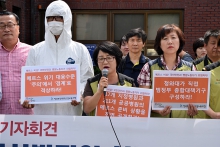Korea: health staff confronted with MERS coronavirus demand government action plan

On May 30, KHMU President Yoo Ji-Hyun announced that the government should form a pan-government taskforce body directly under the Presidential Office. She also requested the government to take the viral disease as a national level disaster, to take actions corresponding to its urgency and seriousness with tertiary infection being considered beyond secondarily infection, and to raise the level of national epidemic crisis from 'caution' to ‘warning’.
KHMU has set up a MERS response team and investigated the actual situation relevant to MERS. The urgently conducted research revealed that medical institutions currently treating MERS patients are in an extremely poor condition. As part of the result, as of May 31, four confirmed patients out of 18 (22.2%) were found to be doctors and nurses who have treated patients with the respiratory virus.
The government has stated that it has specially designated hospitals specializing in MERS patients to ensure more efficient controls. However, manuals about MERS treatment have not been shared among healthcare service providers, and medical staff has yet to be properly trained. In addition, only 105 beds nationwide are placed in rooms equipped with low atmospheric pressure facilities and even the depressed rooms are not single person rooms but shared rooms. Hence, the 105 beds cannot be fully used for patients due to infection risks.
The number of healthcare experts dedicated to patients with MERS is insufficient. For instance, a medical centre, reported “A,” where five confirmed patients are hospitalized, closed five intensive care units and two wards in order to treat MERS patients while deploying 30 nurses for MERS treatment alone.
A total of 17 doctors in the centre are treating the patients, suffering severe fatigue, as there are not enough doctors to allow for shifts.
KHMU has urged the government to state publicly if the nation is fully ready to prevent and cure the new infectious disease, and if it is equipped with sufficient number of proper infrastructure both in terms of human and physical resources. It has also requested the government to reveal the actual preparedness of 17 designated hospitals and 211 public healthcare facilities.
Source: http://bogun.nodong.org/english

